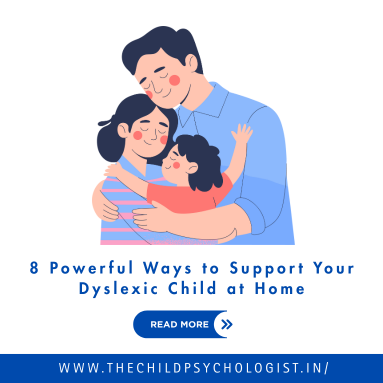Understanding Dyslexia in Children
Dyslexia is one of the most common childhood learning disorders, affecting nearly 10–15% of children worldwide, including many in India. It primarily impacts reading, writing, and spelling skills. Unfortunately, dyslexic children are often misunderstood as lazy, careless, or inattentive. In reality, dyslexia is simply a different way of processing language, not a sign of low intelligence.
Children with dyslexia are often bright, curious, and highly creative. They may excel in problem-solving, visual learning, or storytelling—but struggle with written words. If left unsupported, these struggles can lead to low self-esteem, anxiety, and poor academic performance.
The good news? With early identification, behaviour counselling, therapy, and consistent parental support, dyslexic children can thrive both academically and emotionally. Below are 8 powerful, research-backed strategies every Indian parent can use at home.
1. Read Aloud Together
Reading aloud is one of the most effective ways to help a dyslexic child. When you read with your child, they not only practice decoding words but also hear fluent reading, which improves comprehension and vocabulary.
Parent Tip: Choose bilingual books in Hindi and English or culturally familiar folk tales. These stories keep children engaged while building language skills in both regional and global contexts.
Why it works: Hearing and seeing words simultaneously strengthens the brain’s ability to process language.
2. Use Audiobooks and Visual Learning
Children with dyslexia learn best when they can hear and see content at the same time. Audiobooks paired with physical books or subtitles are excellent tools. They allow children to follow along without the pressure of decoding every single word.
Recommended Apps in India:
- Google Read Along
- Storytel
- Audible
Why it works: Multimodal input (listening + reading) helps children understand content more deeply while reducing frustration.
3. Embrace Multisensory Learning
Multisensory techniques use sight, sound, touch, and movement together, making learning more engaging and memorable. This approach is at the core of Orton-Gillingham-based dyslexia therapy.
Examples for parents to try at home:
- Let your child trace words in sand or on textured surfaces.
- Break a word into syllables and clap while saying each part.
- Use colorful flashcards with visuals and sounds.
Why it works: Multisensory learning activates multiple brain pathways, helping dyslexic children retain new words more effectively.
4. Focus Beyond Spelling
Many parents worry too much about spelling errors. Constant corrections, however, can make a child feel inadequate and reluctant to write. Instead, focus first on their ideas and creativity.
A good approach:
- Ask your child to write a short story or paragraph.
- Let them read it aloud to you.
- Praise their imagination and effort.
- Then, guide them through spelling corrections—gently and selectively.
Why it works: Encouraging creativity builds confidence. Correcting spelling later ensures they don’t associate writing with failure.
5. Break Homework Into Small Steps
Homework and long study sessions can feel overwhelming. Break tasks into short, manageable chunks of 15–20 minutes with small breaks in between.
Practical strategies:
- Use a timer to make learning feel structured.
- Give frequent praise, not just for finishing, but for effort and persistence.
- Alternate difficult tasks with fun or creative activities.
Why it works: Children with dyslexia often have difficulty with attention and memory. Small steps make tasks less stressful and more achievable.
6. Create Word Walls or Personal Dictionaries
A Word Wall or “My Words” dictionary is a fun, interactive way for children to remember tricky words. Encourage them to write down new words, decorate them, and add pictures or meanings.
For example: The word elephant could be written with a small sketch of the animal.
Why it works: Visual association makes spelling less intimidating and more memorable.
7. Protect Your Child’s Self-Esteem
Emotional support is just as important as academic strategies. Dyslexic children often feel frustrated, ashamed, or “less intelligent.” As a parent, you can change this narrative.
Say often:
“You are smart. Your brain just learns differently—and that’s okay.”
Encourage your child’s strengths in art, music, sports, or problem-solving. Remind them that many successful people—scientists, entrepreneurs, and artists—have dyslexia.
Why it works: Confidence is the foundation of learning. A child who feels supported will take more risks and keep trying.
8. Get a Formal Assessment
If you suspect dyslexia, seek a proper evaluation. A child psychologist, counselor therapist, or RCI-registered professional can conduct assessments to identify your child’s needs.
In India, tools like the NIMHANS Index of Specific Learning Disabilities are widely used. Diagnosis helps in:
- Understanding your child’s learning profile
- Getting school accommodations
- Planning therapies such as remedial teaching or behaviour counselling
Why it works: Professional assessment ensures your child receives the right help at the right time.
Bonus: Collaborate with the School
Work closely with teachers to ensure your child gets the support they need. Request accommodations like:
- Extra time in exams
- Oral instructions instead of written-only tasks
- Permission to use typing tools for assignments
Why it works: A supportive school environment reduces stress and improves performance.
Final Words for Parents
Parenting a dyslexic child in India can feel overwhelming, but remember—you are not alone. With patience, empathy, and the right strategies, you can give your child the tools they need to thrive.
Dyslexia is not a reflection of intelligence; it is simply a different way of learning. By combining home support, professional guidance, and behaviour counselling, you can help your child grow into a confident, capable learner.
About the Author
Dr. Vini Jhariya
Clinical and Child Psychologist | RCI Registered | M.Phil. (Clinical Psychology)
Founder – Urjasvini Child Development Center & Urjasvini Special School, Indore
